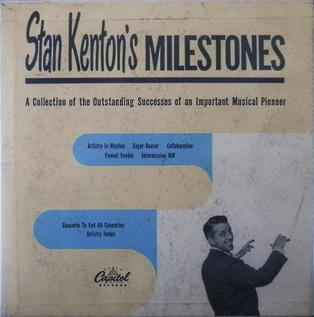Stan Kenton's Milestones
1950 compilation album by Stan Kenton and His Orchestra From Wikipedia, the free encyclopedia
Stan Kenton's Milestones is an album by pianist and bandleader Stan Kenton compiling performances recorded between 1943 and 1947 and originally collected on the Capitol label as a 10-inch LP in 1950 then reissued as a 12-inch LP with additional tracks in 1955.[1][2]
| Stan Kenton's Milestones | ||||
|---|---|---|---|---|
 | ||||
| Compilation album by Stan Kenton and His Orchestra | ||||
| Released | 1950 | |||
| Recorded | 19 November 1943 – December 22, 1947 | |||
| Studio |
| |||
| Genre | Jazz | |||
| Label | Capitol H/T 190 | |||
| Producer | Dave Dexter and Lee Gillette | |||
| Stan Kenton chronology | ||||
| ||||
Reception
The Allmusic review by Scott Yanow said "This music is essential in one form or another" and noted "These performances are still exciting a half-century later".[3]
Track listing
All compositions by Stan Kenton except where noted.
- "Artistry in Rhythm" – 3:20
- "Eager Beaver" – 3:11
- "Collaboration" (Pete Rugolo, Stan Kenton) – 2:41
- "The Peanut Vendor" (Moisés Simons) – 2:45
- "Interlude" (Rugolo) – 3:09 Additional track on 12 inch LP
- "Bongo Riff" (Rugolo) – 2:08 Additional track on 12 inch LP
- "Intermission Riff" (Ray Wetzel) – 3:18
- "Concerto to End All Concertos" – 6:19
- "Artistry Jumps" – 2:40
- "Theme to the West" (Rugolo, Kenton) – 3:12 Additional track on 12 inch LP
- "How Am I to Know" (Jack King, Dorothy Parker) – 2:47 Additional track on 12 inch LP
- Recorded at C.P. MacGregor Studios in Hollywood, CA on November 19, 1943 (tracks 1 & 2), at Radio Recorders in Hollywood, CA on October 30, 1945 (track 9), January 14, 1946 (track 7), July 26, 1946 (track 8), February 28, 1947 (tracks 3 & 11) and September 25, 1947 (track 10) and at RKO–Pathé Studios, NYC on December 6, 1947 (track 4), December 22, 1947 (track 5 & 6)
Personnel
- Stan Kenton – piano, conductor
- Alfred "Chico" Alvarez (tracks 3, 4, 6, 8, 10 & 11), John Anderson (tracks 3, 7–9 & 11), Ray Borden (tracks 1 & 2), Russ Burgher (tracks 7 & 9), John Carroll (tracks 1 & 2), Buddy Childers (tracks 1–4 & 6–11), Karl George (tracks 1 & 2), Ken Hanna (tracks 3, 4, 6, 8, 10 & 11), Bob Lymperis (tracks 7 & 9), Dick Morse (tracks 1 & 2), Al Porcino (tracks 4, 6 & 10), Ray Wetzel (tracks 3, 4 & 6–11) – trumpet
- Milt Bernhart (tracks 3–6, 10 & 11), Eddie Bert (tracks 4–6 & 10), Harry Betts (tracks 4–6 & 10), George Faye (tracks 1 & 2), Harry Forbes (tracks 1–6, 8, 10 & 11), Milt Kabak (tracks 7 & 9), Ray Klein (track 7), Skip Layton (tracks 3 & 11), Jimmy Simms (track 9), Miff Sines (track 8), Kai Winding (tracks 3, 8 & 11), Freddie Zito (tracks 7 & 9) – trombone
- Bart Varsalona – bass trombone
- Al Anthony (tracks 7–9), Eddie Meyers (tracks 1–3 & 11), Boots Mussulli (tracks 3, 7–9 & 11), Frank Pappalardo (track 10), Art Pepper (tracks 1, 2, 4 & 6), George Weidler (tracks 4, 6 & 10) – alto saxophone
- Maurice Beeson (tracks 1 & 2), Bob Cooper (tracks 3, 4 & 6–11), Red Dorris (tracks 1 & 2), Vido Musso (tracks 3, 7–9 & 11), Warner Weidler (tracks 4 6 & 10) – tenor saxophone
- Bob Gioga – baritone saxophone (tracks 1–4 & 6–11)
- Bob Ahern (tracks 1–3, 7–9 & 11), Laurindo Almeida (tracks 4–6 & 10) – guitar
- Eddie Safranski (tracks 3–11), Clyde Singleton (tracks 1 & 2) – bass
- Shelly Manne (tracks 3–11), Joe Vernon (tracks 1 & 2) – drums
- Jack Costanzo – bongos (tracks 4–6 & 10)
- René Touzet – maracas (track 4)
- Stan Kenton (tracks 1, 2, 8 & 9), Ken Hanna (track 11), Pete Rugolo (tracks 3, 5, 6 & 10) – arranger
References
Wikiwand - on
Seamless Wikipedia browsing. On steroids.
